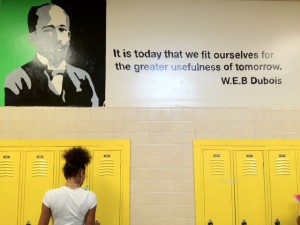Delia Davis-Dyke didn’t always want to be a middle school administrator.
Her first aspiration was to be an attorney, but she was moved by the words of one of early bosses: “Major in what you love and the money will come.” So Ms. Davis-Dyke studied Spanish until she realized she wanted to have the same valuable impact that a number of educators had on her life.
Educators were key in Delia’s development during her middle years. Her mom died when she was just 13 years old, and without the guidance of the teachers around her, who knows what might have happened?
“(Because of) the trauma that I went through having lost my parent,” Davis-Dyke explained, “it was important to have caring adults who could walk me through the process and tell me I’m OK. I can’t imagine myself anywhere else today besides middle school.”
Davis-Dykes understands the complexities of middle grades students. She knows that they are changing a great deal during the years she spends with them at Kramer Middle School in Washington, D.C. Though looking to establish themselves as individuals, they still need guidance from adults.
“Middle school students are not yet grown,” Davis-Dyke said. “Don’t think that they don’t require support and guidance. They may speak more maturely. They (may) have a grown attitude and sassiness. They may be man-ish and woman-ish, but they are still children who need guidance, love, modeling, and support.”
One reason she is such an exemplary assistant principal is that Davis-Dyke understands a great deal about how an early adolescent’s brain develops. Researchers tell us that other than the period from birth to two years old, there is no other time in a human being’s life that the brain grows as much as during the early teen years. “Their brains are still developing, so even though they can look at you and tell you right from wrong, research shows there are parts of their brains that aren’t solidified until they’re twenty-one years old. When they have to make those rational, logical, and ethical decisions, their brain is not fully developed. (As a result), we have to constantly teach, re-teach, model, teach, re-teach, model, over and over again,” she said.
To help their students have the supports they need to succeed, Davis-Dyke and the team at Kramer work with a number of partners, including the Johns Hopkins University Center for Talented Youth, the Far Southeast Family Strengthening Collaborative and the Marzano Research Laboratory. Working with these partners, the Kramer staff puts structures in place to ensure the academic, emotional, and social success of their students.
When asked about how she handles helping middle school students to deal with all of the changes they are going through, Davis-Dyke reminded me of a great truth: “Middle school is not for the faint of heart.”
Her students are fortunate that Ms. Davis-Dyke is committed to having the same positive impact on her students that her middle school teachers had on her. She clearly has the heart for this work.
Geneviève DeBose is a Washington Teaching Ambassador Fellow on loan from Bronx Charter School for the Arts in New York City. She wants to give a special shout-out to all of the Kramer staff and Principal Kwame Simmons for opening up their school to a fellow middle school teacher.






